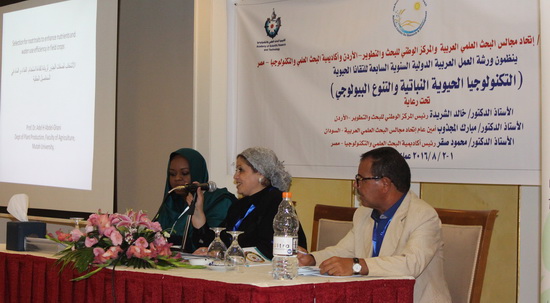
Jordan Hosts Workshop on Plant Biotechnology and Biodiversity
August 17, 2016| |
The 7th Annual International Arab Workshop on Biotechnology: Plant Biotechnology & Biodiversity was held on August 1-2, 2106 at Amman, Jordan. The workshop was organized by the Egyptian Academy of Science Research and Technology, Egypt (ASRT), the National Center for Research and Development, the Higher Council for Science and Technology in Jordan and Arab Biotechnology Association, and the Federation of Arab Scientific Research Councils (FASRC). More than 70 participants attended the workshop from different Arab countries including Egypt, Sudan, Kuwait, Tunisia, and Jordan.
At the opening ceremony, Prof. Mahmoud Sakr, President of Academy of Science Research and Technology, Egypt (ASRT) talked about the importance of the Arab collaboration in the scientific fields, especially in the field of biotechnology. He also added that Egypt started a national project for documentation of plant resources using DNA barcoding techniques. Prof. Mubarek Al-Magzoub of FASRC, Sudan emphasized that the Federation is dedicated to coordinate efforts and exchange of scientific information among nations. The workshop included 40 presentations, in addition to the posters.
The two-day workshop covered the following topics: conservation of plant genetic resources and genetic diversity, phenotyping, genotyping for genomics applications, plant cell and tissue culture, plant transformation and biotechnology of medicinal plants. Prof. Naglaa Abdallah, Director of EBIC gave a presentation entitled Next- generation genome engineering: Geminivirus as vectors for precise plant genome engineering. She also presented the global status of biotech crops in 2015 and the use of CRISPR as one of the new breeding techniques. "Targeted genome editing is one of the new breeding techniques (NBT) that has the potential to accelerate genome modification in a precise and predictable manner...CRISPR has many advantages in terms of price, regulation, speed, accuracy, specificity, and simplicity. In addition, it could function in all domains of life and could be used in genetic therapy and personalized medicine," said Dr. Abdallah.
For more information, contact Prof. Naglaa Abdallah at Naglaa.abdallah@agr.cu.edu.eg.
| |
Biotech Updates is a weekly newsletter of ISAAA, a not-for-profit organization. It is distributed for free to over 22,000 subscribers worldwide to inform them about the key developments in biosciences, especially in biotechnology. Your support will help us in our mission to feed the world with knowledge. You can help by donating as little as $10.
-
See more articles:
-
News from Around the World
- Banana Fungus DNA Unravelled; Findings to Lead to Hardier Bananas
- Egyptian Students Organize Biotech Seminars for Sharing Knowledge
- Arctic® Fuji Apple Close to U.S. Regulatory Approval
- Capacity Building Sessions with Biosafety Regulators Held in Pakistan
- New Zealand EPA Declares Glyphosate as Noncarcinogenic
- Scientists Decode Major Pathogen of Barley
-
Research Highlights
- Researchers Engineer White Maize for Astaxanthin Production
- Isoamylase 1 Affects Starch Production and Amylopectin Structure in Durum Wheat Endosperm
-
Beyond Crop Biotech
- BplMYB46 Gene Affects Abiotic Stress Tolerance and Secondary Cell Wall Synthesis in Birch
- Researchers Sequence Tobacco Hornworm Genome
-
From the BICs
- Jordan Hosts Workshop on Plant Biotechnology and Biodiversity
-
Resources
- Biotech Country Facts and Trends
- TEDxUPM Talk on "GMOs: Seeds of Destruction?"
- World Seed Treatment Market Report
-
Plant
- Scientists Use Recombineering to Initiate Site-Directed Mutagenesis
-
Read the latest: - Biotech Updates (February 4, 2026)
- Gene Editing Supplement (January 28, 2026)
- Gene Drive Supplement (February 22, 2023)
-
Subscribe to BU: - Share
- Tweet

